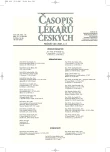-
Medical journals
- Career
The Polycystic Ovary Syndrome and Its Male Equivalent
Authors: M. Dušková; M. Hill; L. Stárka
Authors‘ workplace: Endokrinologický ústav, Praha
Published in: Čas. Lék. čes. 2007; 146: 251-255
Category: Original Article
Overview
Background.
The polycystic ovary syndrome is multifactorial disease. The autosomal genetic transfer of the disease predisposition is the basis for hypothesis that there can exist a male equivalent of PCOS. Androgenetic alopecia has been suggested as the symptom of the male phenotype of PCOS.Methods and Results.
A group of 30 men with premature hair loss was involved in the present study. In all individuals, their hormonal profile was determined and insulin tolerance test was made. Robust Mann-Whitney test and Fisher’s exact test were used for statistic analysis. Based on the laboratory findings two subgroups of individuals were shown. The first one revealed similar hormonal changes as women with PCOS, namely lower SHBG, lower FSH and elevated free androgen index. The other had either no anomaly in steroid spectrum. Both subgroups did not differ in either BMI or age. The subgroup with hormonal changes resembling those of PCOS, showed a significantly higher insulin resistance than the group without these changes.Conclusions.
Based on our results it can be concluded that men with premature alopecia and hormonal changes partially resembling those typical for female PCOS, might probably represent the male equivalent of PCOS.Key words:
polycystic ovary syndrome, male phenotype of PCOS, androgenetic alopecia, FSH, SHBG, insulin resistance.
Labels
Addictology Allergology and clinical immunology Angiology Audiology Clinical biochemistry Dermatology & STDs Paediatric gastroenterology Paediatric surgery Paediatric cardiology Paediatric neurology Paediatric ENT Paediatric psychiatry Paediatric rheumatology Diabetology Pharmacy Vascular surgery Pain management Dental Hygienist
Article was published inJournal of Czech Physicians

-
All articles in this issue
- The Polycystic Ovary Syndrome and Its Male Equivalent
- Polyglandular Activation of Autoimmunity as a Manifestation of Subclinical Endocrinopathies
- Evaluation of Results of Iodine Prophylaxis in Czech Republic
- Diabetes Mellitus in Adult Patients with Type 1 Diabetes Shows Immunological, Functional and Clinical Differences Depending on the Presence of Autoimmune Thyroiditis
- Endocrine Orbitopathy and Significance of Autoantibodies Against 1D Protein
- Influence of Early Postnatal Nutrition in Preterm Infants on Their Anthropometric and Hormonal Characteristics at the Age of 10 Years
- Relationships Between the „Eating Inventory“ Factors, Socioeconomic Status, Anthropometric Body Adiposity Indexes and Health Risks in Czech Population
- Levels of Hormones in Plasma and in Synovial Fluid of Knee Joint of Patients with Rheumatoid Arthritis
- The Institute of Endocrinology Celebrates its 50th Anniversary. How is the Institute Poised for the Next 50 Years?
- Half Century of the Continuation of the Institute of Endocrinology in Prague
- History, Presence and Trends of Steroid Endocrinology
- Study of the Genetic Causes of Polygenetically Determined Endocrinopathies – Patience Can Bring Success
- Growth Hormone Treatment in the Institute of Endocrinology
- The Role of Complement in Autoimmune Thyroid Disorders
- Quality of Life in the Patients with Disorders of Sexual Development and with Y Chromosome in Karyotype
- Polycystic Ovary Syndrome in 2006
- Neurosteroids and Their Function
- Regulatory Network of Transcription Factors: Their Key Role in the Development and Function of Pancreas
- Genetic Background of Mitochondrial Diabetes
- Obesity Based on Mutation of Genes Involved in Energy Balance
- Osteoporosis and Aterosclerosis – is there Any Pathogenetic Association?
- Journal of Czech Physicians
- Journal archive
- Current issue
- Online only
- About the journal
Most read in this issue- Neurosteroids and Their Function
- Relationships Between the „Eating Inventory“ Factors, Socioeconomic Status, Anthropometric Body Adiposity Indexes and Health Risks in Czech Population
- Obesity Based on Mutation of Genes Involved in Energy Balance
- Growth Hormone Treatment in the Institute of Endocrinology
Login#ADS_BOTTOM_SCRIPTS#Forgotten passwordEnter the email address that you registered with. We will send you instructions on how to set a new password.
- Career

